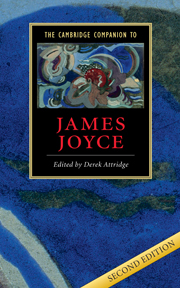Book contents
- Frontmatter
- 1 Reading Joyce
- 2 Joyce the Irishman
- 3 Joyce the Parisian
- 4 Joyce the modernist
- 5 Dubliners
- 6 Stephen Hero and A Portrait of the Artist as a Young Man
- 7 Ulysses
- 8 Finnegans Wake
- 9 Joyce’s shorter works
- 10 Joyce and feminism
- 11 Joyce and sexuality
- 12 Joyce and consumer culture
- 13 Joyce, colonialism, and nationalism
- Further reading
- Index
- Series List
13 - Joyce, colonialism, and nationalism
Published online by Cambridge University Press: 28 May 2006
- Frontmatter
- 1 Reading Joyce
- 2 Joyce the Irishman
- 3 Joyce the Parisian
- 4 Joyce the modernist
- 5 Dubliners
- 6 Stephen Hero and A Portrait of the Artist as a Young Man
- 7 Ulysses
- 8 Finnegans Wake
- 9 Joyce’s shorter works
- 10 Joyce and feminism
- 11 Joyce and sexuality
- 12 Joyce and consumer culture
- 13 Joyce, colonialism, and nationalism
- Further reading
- Index
- Series List
Summary
Joyce's life spans a period in history in which material conditions, political structures, and intellectual life throughout the world were profoundly shaped by the growth and decline of European empires and the flourishing of various nationalisms, both imperialist and anti-imperialist. When Joyce was born in 1882 the 'scramble for Africa', and the era that one historian has called the 'age of empire', had just begun. When he died in 1941 the world was engulfed in the Second World War, a conflict that would fundamentally alter the balance of global power, and the age of decolonization was under way. A good deal of recent Joyce scholarship has explored Joyce's relation to this historical trajectory. Much of this scholarship is informed by debates in post-colonial studies, the academic field most explicitly committed to examining the complex set of issues we can group under the headings of 'colonialism' and 'nationalism'. Colonialism and nationalism were among the period's most visible and important sources of conflict and change, and were the subjects of much discussion and debate. At the same time, they were so important and pervasive - both as realities and as ideologies - that they became part of contemporary conceptions of 'reality' and 'common sense' and supplied many of the unspoken rules and assumptions of the time. Postcolonial scholars study colonialism and nationalism in their visibility, as the subjects of explicit discussion and struggle, and in their invisibility, as the secret structures that underlie much of Western intellectual and political life. Ireland's double status - as both an agent and a victim of British imperialism - is important to any investigation of how Joyce's works engage with these issues.
- Type
- Chapter
- Information
- The Cambridge Companion to James Joyce , pp. 254 - 271Publisher: Cambridge University PressPrint publication year: 2004
- 3
- Cited by

